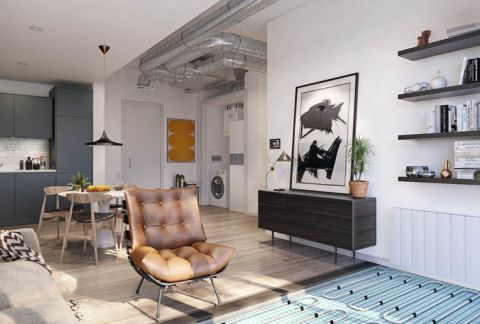Buying Guides
Our experts have put together the top things to consider for each of our product ranges. Helping you choose the best product for you and your family.
Portable Heating
Dehumidifiers
Air Purifiers
Cooling fans
Sustainability
Sustainability plays a key role in the future of Dimplex. We believe it's our moral responsibility to do what we can for future generations.

Decarbonising heat and what lessons have been learnt?
Decarbonising heat is seen as a key area to address if the UK is to achieve its net-zero 2050 target. The scale, complexity, and cost of the transition to low carbon heating technology means the industry needs time and support to adjust to the changes it faces. The much-anticipated regulatory framework and clear strategy for the energy transition process should provide a reliable platform to take on the challenges on our journey to a low carbon future.

Debunking the misconceptions of electric panel heating
Modern, energy efficient electric panel heaters that offer a high level of control to users, whilst using low carbon energy, are unrecognisable from the inefficient, clunky panel heaters of the past. Despite technological advances, the perception of electric heating mostly relates to the old technology that grew in popularity with the advent of cheaper nuclear energy in the late 1950s. Traditionally, panel heaters in homes were accompanied by storage heating to make use of the energy generated ‘off-peak’ and assist with under-utilised night-time energy available on the grid. In addition, electric heating has long been a convenient form of secondary heating, for example with the use of portable fan heaters.

What is the requirement for HVAC system compliance for a collective housing application?
One regulatory requirement for collective housing applications, or large residential developments, is to comply with Part L of the Building Regulations. The updated Part L has been published and is concerned with the conservation of power and fuel in buildings. Fixed heating, ventilation and air conditioning services in new residential dwellings play a large part in achieving the required energy performance of a building and their targets and requirements are outlined in this Approved Document.

Seven key considerations that influence the specification of effective communal heat networks in high-rise apartments
Although certain requirements will vary from project to project, such as available space or the decision to include comfort cooling, there are seven key factors that ultimately impact the specification of a communal heat network within high-rise residential apartment:

Comfort cooling in city-based apartments
What are the considerations for comfort cooling in city-based apartments?

How does combining HVAC technologies maximise development ROI and help improve the energy efficiency of developments?
Innovative low carbon hybrid electric technologies are increasingly coming into focus for modern developments where electrifying HVAC technologies can help maximise the ROI and improve energy efficiency. Changing legislation focuses on increasing energy efficiency standards for new domestic dwellings. The move away from natural gas is expected to become necessary for new residential buildings by 2025 and could be beneficial for their compliance from 2022.

Brrrrrr-acing for Winter
The shortest day and longest night of the year will fall on December 21st., marking the winter solstice and the start of the coldest of the seasons. While other definitions place the start of winter as December 1st, temperatures have been falling steadily since the summer and the solstice is a timely reminder that heating indoor spaces will only become tougher as we journey into the new year.

What are the barriers to increasing uptake of low carbon heating technologies?
5
With heat accounting for approximately a third of the UK’s greenhouse emissions, the decarbonisation and electrification of heating in homes will play a central role in achieving the UK’s 2050 net-zero carbon target. The transition from prolific use of high carbon fossil fuels to low carbon heating presents the industry with many challenges. The relatively short space of time in which environmental targets need to be achieved means that the electrification of heating must be accomplished at great speed.

What are the 12 key factors that could shape a successful and sustainable UK heat pump market?
Domestic, industrial, and commercial heat accounts for a third of UK carbon emissions. Therefore, it comes as no surprise that the spotlight is on the decarbonisation of heat in buildings.

Zeroth Energy System shortlisted for prestigious London Construction Award

A to Z: Joint ASHRAE UK and CIBSE event to host presentation on Zeroth from Glen Dimplex Heating & Ventilation
Glen Dimplex Heating and Ventilation will present at the CIBSE East Midlands & ASHRAE UK Midlands Chapter Joint Event for professional engineers and architects. This is a prime opportunity to hear from some of the most respected authorities in the heating and ventilation and building services engineering sectors, and learn about some of the most cutting-edge technology to date in the UK.

Why should we be installing electric heating into our homes?
The way we heat our homes is changing as existing systems need to move away from gas-based heating towards electrification. The UK government is championing retrofitting with heat pumps, but what benefit could direct electric products offer in an electrified future?











